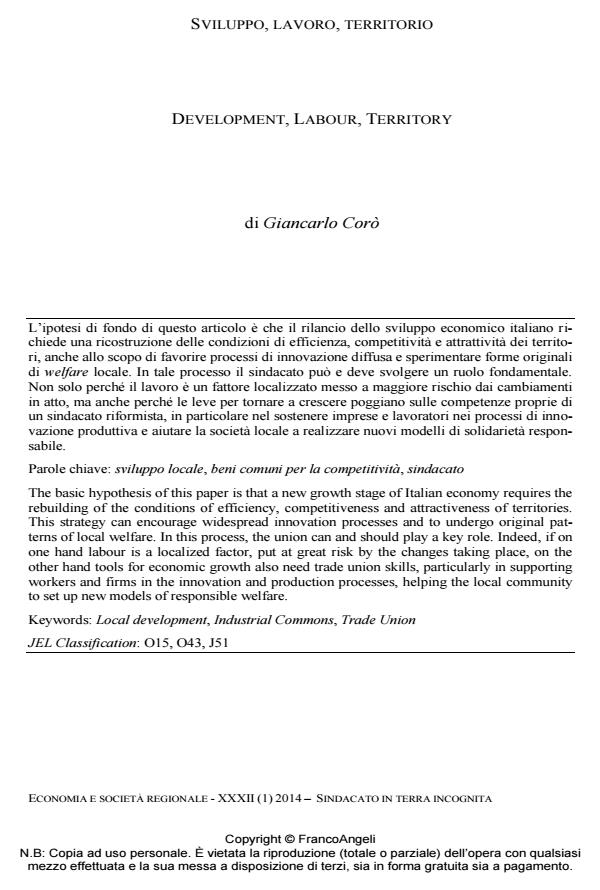Sviluppo, lavoro, territorio.
Titolo Rivista ECONOMIA E SOCIETÀ REGIONALE
Autori/Curatori Giancarlo Corò
Anno di pubblicazione 2014 Fascicolo 2014/1 Lingua Italiano
Numero pagine 13 P. 25-37 Dimensione file 595 KB
DOI 10.3280/ES2014-001003
Il DOI è il codice a barre della proprietà intellettuale: per saperne di più
clicca qui
Qui sotto puoi vedere in anteprima la prima pagina di questo articolo.
Se questo articolo ti interessa, lo puoi acquistare (e scaricare in formato pdf) seguendo le facili indicazioni per acquistare il download credit. Acquista Download Credits per scaricare questo Articolo in formato PDF

FrancoAngeli è membro della Publishers International Linking Association, Inc (PILA)associazione indipendente e non profit per facilitare (attraverso i servizi tecnologici implementati da CrossRef.org) l’accesso degli studiosi ai contenuti digitali nelle pubblicazioni professionali e scientifiche
L’ipotesi di fondo di questo articolo è che il rilancio dello sviluppo economico italiano richiede una ricostruzione delle condizioni di efficienza, competitività e attrattività dei territori, anche allo scopo di favorire processi di innovazione diffusa e sperimentare forme originali di welfare locale. In tale processo il sindacato può e deve svolgere un ruolo fondamentale. Non solo perché il lavoro è un fattore localizzato messo a maggiore rischio dai cambiamenti in atto, ma anche perché le leve per tornare a crescere poggiano sulle competenze proprie di un sindacato riformista, in particolare nel sostenere imprese e lavoratori nei processi di innovazione produttiva e aiutare la società locale a realizzare nuovi modelli di solidarietà responsabile.;
Keywords:Sviluppo locale, beni comuni per la competitività, sindacato
Jel codes:O15, O43, J51
- Acemoglu D. e Robinson J. (2013). Perché le Nazioni falliscono. Milano: Il Saggiatore.
- Annoni P. e Dijkstra L. (2013). EU Regional Competitiveness Index. Bruxelles: Economic Analysis Unit, DG Regio
- Berger S. (2013). Making in America. Cambridge (MA): MIT Press.
- Buciuni G., Corò G. e Micelli S. (2013). Rethinking the Role of Manufacturing in Global Value Chains, Industrial and Corporate Change. Advance Access published November.
- Calafati A.G. (2009). Economie in cerca di città. La questione urbana in Italia. Roma: Donzelli.
- Cgil (2013). Il Lavoro decide il Futuro. XVII Congresso. Roma, dicembre.
- Corò G. (2008). Economie dell’integrazione territoriale. In: Messina P., a cura di. Reti di impresa e Reti di città. Padova: QuAM 4
- Corò G. (2013). I sistemi locali nelle catene globali del valore, Rivista di economia italiana, 1.
- Corò G. e Gurisatti P. (2013). Capacità locali. Per una nuova economia dei territori produttivi. Economia e società regionale, 1, DOI: 10.3280/ES2013-001002
- Corò G. (2014). Piccole imprese oltre frontiera, Italianieuropei, 1.
- Kenny C. (2012). Va già meglio. Lo sviluppo globale e le strategie per migliorare il mondo. Torino: Bollati Boringhieri.
- Meldolesi L. (2013). Carlo Cattaneo e lo spirito italiano. Soveria Mannelli: Rubettino.
- Moretti E. (2013). La Nuova Geografia del Lavoro. Milano: Mondadori.
- Pisano G. P. e Shih W.C. (2012). Producing Prosperity. Harvard: Harvard Business Press.
- Storper M. (2013). Keys to the City. Princeton: University Press.
- Zanetto M., Calzavara A., Cecchin A. e Soriani S. (2010). Nord Est. Linee essenziali per una trasformazione sostenibile del territorio, Economia e società regionale, 1, DOI: 10.3280/ES2010-001009
- Zanetto M., Calzavara A. e Soriani S. (2013). Le linee chiave del dibattito recente sull’area metropolitana centro-veneta. Economia e società regionale, 1, DOI: 10.3280/ES2013-001004
- Artigianato, città, politiche: il caso di Venezia e della nuova Legge regionale n. 34/20181 Remi Wacogne, Roberto Paladini, in ARCHIVIO DI STUDI URBANI E REGIONALI 130/2021 pp.27
DOI: 10.3280/ASUR2021-130002 - Rileggendo bruno trentin nella nuova grande trasformazione Francesco Sinopoli, in ECONOMIA E SOCIETÀ REGIONALE 3/2015 pp.117
DOI: 10.3280/ES2014-003013
Giancarlo Corò, Sviluppo, lavoro, territorio. in "ECONOMIA E SOCIETÀ REGIONALE " 1/2014, pp 25-37, DOI: 10.3280/ES2014-001003